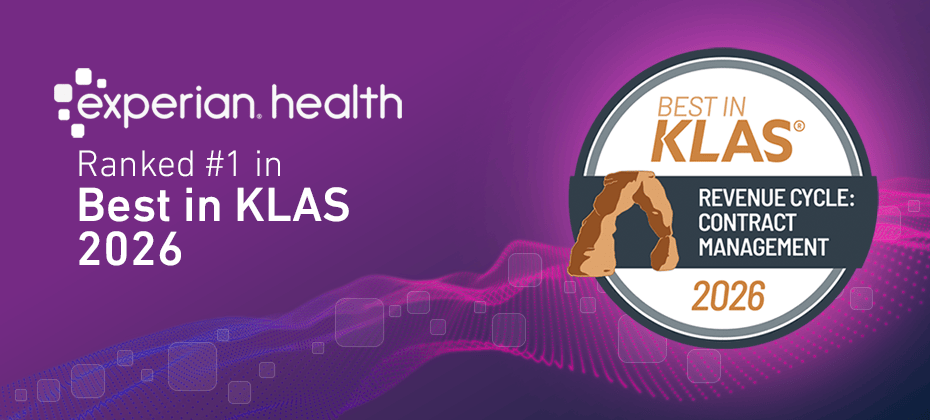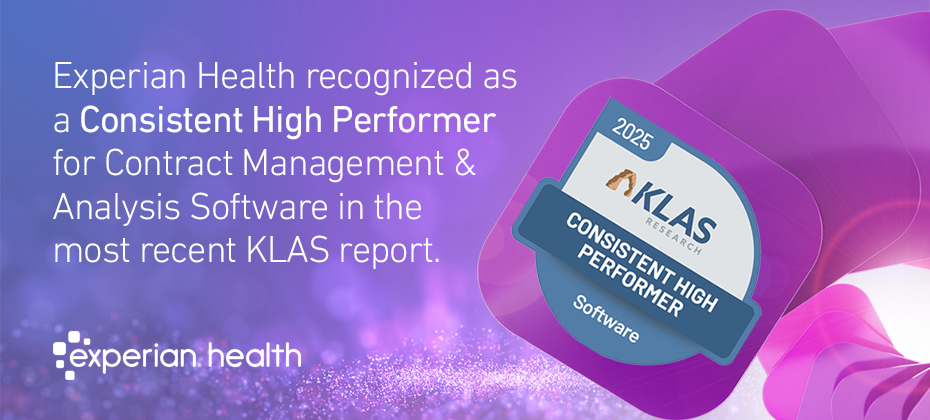Claims & Contract Management
Improve financial performance with automated, clean and data-driven medical claims management.

Experian Health’s Contract Manager and Contract Analysis product has been ranked #1 in the 2026 Best in KLAS: Software & Services report, for the fourth consecutive year. Adam Gale, CEO of KLAS Research, says, “The Best in KLAS awards recognize the vendors who consistently deliver excellence through partnership with healthcare organizations. Winning this award means customers trust you to help them succeed in our rapidly changing healthcare landscape. This means helping them to improve patient care, achieve better outcomes, and find true ROI. We’re honored to amplify the voice of providers and payers at KLAS, and to celebrate those vendors who turn feedback into action.” Contract Manager, paired with Contract Analysis, empowers healthcare providers by continuously auditing payer contract performance. This solution identifies underpayments, supports recovery efforts, and delivers actionable insights that providers can use to negotiate stronger, more sustainable payer contracts, ultimately supporting long-term financial stability. Rob Stucker, VP of Product Management at Experian Health, says, “We’re proud that Contract Manager and Contract Analysis has once again been recognized as #1 in the 2026 Best in KLAS Software & Services report for the fourth consecutive year. This recognition reflects the meaningful impact our solution delivers by uncovering underpayments, accelerating revenue recovery and equipping provider organizations with the data they need to negotiate contracts from a position of strength. We’re committed to supporting our clients with innovative tools that simplify healthcare.” Learn more about how Contract Manager and Contract Analysis can help your healthcare organization validate reimbursement accuracy, recover underpayments and boost revenue. Learn more Contact us

Widespread adoption of AI in healthcare revenue cycle management is growing, according to Experian Health’s latest survey. But many providers feel that human oversight still plays a critical role. Discover insights on key trends, use cases and barriers to AI’s evolving role in RCM.

For healthcare providers, claim denials are a constant drain on revenue and staff capacity. Jason Considine, President at Experian Health, sees three ways artificial intelligence (AI) can break this cycle: by preventing avoidable errors, prioritizing high-value resubmissions and using data insights to reduce denials over time.

Claim scrubbing technology helps healthcare providers submit clean, accurate claims from the start - improving accuracy, reducing denials and maximizing reimbursements.

Experian Health is very pleased to announce that we’ve been recognized as a Consistent High Performer for Contract Management & Analysis Software in the 2025 KLAS report.

Denial management is the process of addressing why healthcare claims are rejected or denied, instead of resolving them after they occur. This article explores denial management strategies, why outdated processes fail and how AI-driven solutions can help reduce denials and streamline workflows.

Top reasons for healthcare claim denials include missing or inaccurate data, lack of prior authorizations, and incomplete patient registration.

In this guide to healthcare revenue cycle management, learn how healthcare organizations can optimize the revenue cycle process at every stage of the patient journey to increase reimbursements and improve operational efficiency.

AI and automation are transforming the claims management process. By streamlining workflows and minimizing errors, these technologies can help providers reduce denials, enhance operational efficiency and improve patient access to care.